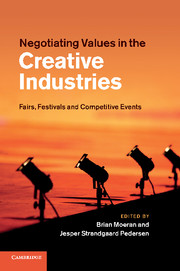Book contents
- Frontmatter
- Contents
- Figures
- Tables
- Contributors
- Acknowledgements
- Introduction
- 1 A Salon’s life
- 2 Art fairs
- 3 Biennalization and its discontents
- 4 Staging auctions
- 5 The book fair as a tournament of values
- 6 Inventing universal television
- 7 Transforming film product identities
- 8 Event institutionalization and maintenance
- 9 Tradition and transformation at the Fan Fair festival
- 10 Between art and commerce
- 11 Configuring sustainability at fashion week
- 12 An inconvenient truce
- 13 The retrospective use of tournament rituals in field configuration
- Afterword Converting values into other values
- Author index
- Subject index
- References
5 - The book fair as a tournament of values
Published online by Cambridge University Press: 25 October 2011
- Frontmatter
- Contents
- Figures
- Tables
- Contributors
- Acknowledgements
- Introduction
- 1 A Salon’s life
- 2 Art fairs
- 3 Biennalization and its discontents
- 4 Staging auctions
- 5 The book fair as a tournament of values
- 6 Inventing universal television
- 7 Transforming film product identities
- 8 Event institutionalization and maintenance
- 9 Tradition and transformation at the Fan Fair festival
- 10 Between art and commerce
- 11 Configuring sustainability at fashion week
- 12 An inconvenient truce
- 13 The retrospective use of tournament rituals in field configuration
- Afterword Converting values into other values
- Author index
- Subject index
- References
Summary
Based on intensive fieldwork at the Frankfurt, London and Tokyo Book Fairs, this chapter describes the role of international book fairs in the publishing industry and analyzes how, by bringing participants together in short-term, face-to-face interaction in a structured environment, they define and reassert the economic, social and symbolic values that constitute the overall field of publishing.
In many respects, international book fairs comply with the criteria set out by Arjun Appadurai (1986: 21) in his seminal discussion of ‘tournaments of value’ discussed in the Introduction to this book. The criteria that he lays out regarding such tournaments’ spatial and temporal removal from the routine of everyday economic life, the status contests engaged in by participants and the relevance of their outcomes for ordinary everyday among them, are all relevant for book fairs. They also fit within Bourdieu’s discussion of fields of cultural production with their mechanisms of consecration, and structural homology between creative works, positions, and actual position-taking as participants seek to capitalize on opportunities made available in a specific field (Bourdieu, 1993: 84, 133, 182).
- Type
- Chapter
- Information
- Negotiating Values in the Creative IndustriesFairs, Festivals and Competitive Events, pp. 119 - 144Publisher: Cambridge University PressPrint publication year: 2011
References
- 12
- Cited by

